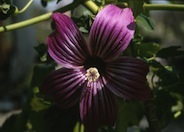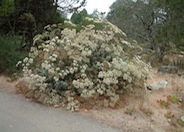
Common name:Island Tree Mallow
Botanical name:Lavatera assurgentiflora
This is a fast growing, evergreen, flowering shrub that works great as a foundation planting or windbreak. They require little maintenance other than occasional shearing to keep it dense.

Common name:Santa Ana Cardinal Coral Bells
Botanical name:Heuchera 'Santa Ana Cardinal'
This Heuchera is believed to be a hybrid between the native Heuchera maxima and the non-native Heuchera sanguinea. The name is a little misleading as the flower is more pinkish red than it is red or cardinal. Best used in dry shady conditions in well drained soil. Once established requires little care. Susceptible to mealy bugs and root rot if it receives too much water. Most effective when used in mass plantings. Much smaller leaf than maxima hybrids and grows to 18-24" x 18-24".

Common name:Pink Mexican Evening Primrose
Botanical name:Oenothera speciosa 'Rosea'
Oenothera berlandieri is a perennial. Grows 10"-12" high, with profuse showing of 1.5" rose pink blooms in summer. Flowers open in daytime and stems die back after bloom. Can be highly invasive.

Common name:St. Catherine's Lace
Botanical name:Eriogonum giganteum
St. Catherine's Lace is a large open shrub growing 4-5 ft. high and 3-4 ft wide with woolly, gray leaves and flat clusters of cream flowers that turn rust with age. It is a California native that is drought tolerant. It attracts butterflies and beneficial insects. - Cornflower Farms
More than half of the water used at your home is for outside purposes. Studies show that on average, half of the water used outdoors is wasted. The leading cause of waste is incorrectly set and poorly managed irrigation controllers. The second biggest cause of wastage is broken irrigation equipment that goes undetected. There are a few basic things you can do to make a big difference in your water use.
Click in the green box for more information
Designer:
Photographer: GardenSoft
Practice grass-cycling by leaving short grass clippings on lawns after mowing, so that nutrients and organic matter are returned to the soil.
Adjust sprinklers to avoid watering sidewalks and driveways.
Drip and other smart irrigation delivers water directly to roots, allowing no excess water for weeds.